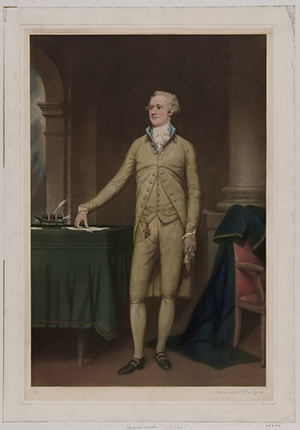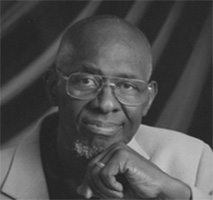Historic Document
Federalist 68, 70, 72 (1788)
Alexander Hamilton | 1788

Library of Congress, Prints and Photographs Division
Summary
After the Constitutional Convention adjourned in September 1787, Alexander Hamilton spearheaded an initiative to lead the public discussion of the draft instrument through The Federalist Papers. In a single week in March 1788, there appeared the three essays from which these extracts are excerpted, discussing the nature of the executive authority under the Constitution. In these essays, we find two strands of thought. First, the executive is identified as the unique vehicle of necessary “secrecy,” “energy,” and “dispatch” in administering the affairs of government. Secondly, Hamilton identifies the executive as part of that popular basis of the government that is designed to assure that government operates on the basis of the “deliberate sense of the community.” It is further to be observed that we find here the development of that nomenclature that leads the United States uniquely to deploy the term “Administration” in defining the executive office.
Selected by

William B. Allen
Emeritus Dean of James Madison College and Emeritus Professor of Political Science at Michigan State University

Jonathan Gienapp
Associate Professor of History at Stanford University
Document Excerpt
Federalist 68:
THE mode of appointment of the Chief Magistrate of the United States is almost the only part of the system, of any consequence, which has escaped without severe censure, or which has received the slightest mark of approbation from its opponents. The most plausible of these, who has appeared in print, has even deigned to admit that the election of the President is pretty well guarded. I venture somewhat further, and hesitate not to affirm, that if the manner of it be not perfect, it is at least excellent. It unites in an eminent degree all the advantages, the union of which was to be wished for.
It was desirable that the sense of the people should operate in the choice of the person to whom so important a trust was to be confided…
It was equally desirable, that the immediate election should be made by men most capable of analyzing the qualities adapted to the station, and acting under circumstances favorable to deliberation, and to a judicious combination of all the reasons and inducements which were proper to govern their choice. A small number of persons, selected by their fellow-citizens from the general mass, will be most likely to possess the information and discernment requisite to such complicated investigations. …
Another and no less important desideratum was, that the Executive should be independent for his continuance in office on all but the people themselves… This advantage will also be secured, by making his re-election to depend on a special body of representatives, deputed by the society for the single purpose of making the important choice.
All these advantages will happily combine in the plan devised by the convention; which is, that the people of each State shall choose a number of persons as electors, equal to the number of senators and representatives of such State in the national government, who shall assemble within the State, and vote for some fit person as President...
The process of election affords a moral certainty…that there will be a constant probability of seeing the station filled by characters pre-eminent for ability and virtue. And this will be thought no inconsiderable recommendation of the Constitution, by those who are able to estimate the share which the executive in every government must necessarily have in its good or ill administration. Though we cannot acquiesce in the political heresy of the poet who says: “For forms of government let fools contest That which is best administered is best,”…the true test of a good government is its aptitude and tendency to produce a good administration.”
Federalist 70:
THERE is an idea, which is not without its advocates, that a vigorous Executive is inconsistent with the genius of republican government. The enlightened well-wishers to this species of government must at least hope that the supposition is destitute of foundation; since they can never admit its truth, without at the same time admitting the condemnation of their own principles. Energy in the Executive is a leading character in the definition of good government. It is essential to the protection of the community against foreign attacks; it is not less essential to the steady administration of the laws; to the protection of property against those irregular and high-handed combinations which sometimes interrupt the ordinary course of justice; to the security of liberty against the enterprises and assaults of ambition, of faction, and of anarchy...
There can be no need, however, to multiply arguments or examples on this head. A feeble Executive implies a feeble execution of the government. A feeble execution is but another phrase for a bad execution; and a government ill executed, whatever it may be in theory, must be, in practice, a bad government.
Taking it for granted, therefore, that all men of sense will agree in the necessity of an energetic Executive, it will only remain to inquire, what are the ingredients which constitute this energy? How far can they be combined with those other ingredients which constitute safety in the republican sense? And how far does this combination characterize the plan which has been reported by the convention?
The ingredients which constitute energy in the Executive are, first, unity; secondly, duration; thirdly, an adequate provision for its support; fourthly, competent powers.
The ingredients which constitute safety in the republican sense are, first, a due dependence on the people, secondly, a due responsibility.
Those politicians and statesmen who have been the most celebrated for the soundness of their principles and for the justice of their views, have declared in favor of a single Executive and a numerous legislature. They have with great propriety, considered energy as the most necessary qualification of the former, and have regarded this as most applicable to power in a single hand, while they have, with equal propriety, considered the latter as best adapted to deliberation and wisdom, and best calculated to conciliate the confidence of the people and to secure their privileges and interests.
That unity is conducive to energy will not be disputed. Decision, activity, secrecy, and despatch will generally characterize the proceedings of one man in a much more eminent degree than the proceedings of any greater number; and in proportion as the number is increased, these qualities will be diminished.
This unity may be destroyed in two ways: either by vesting the power in two or more magistrates of equal dignity and authority; or by vesting it ostensibly in one man, subject, in whole or in part, to the control and co-operation of others, in the capacity of counsellors to him…. They are both liable, if not equal, to similar objections, and may in most lights be examined in conjunction. …
Wherever two or more persons are engaged in any common enterprise or pursuit, there is always danger of difference of opinion. If it be a public trust or office, in which they are clothed with equal dignity and authority, there is peculiar danger of personal emulation and even animosity. From either, and especially from all these causes, the most bitter dissensions are apt to spring. Whenever these happen, they lessen the respectability, weaken the authority, and distract the plans and operation of those whom they divide…. And what is still worse, they might split the community into the most violent and irreconcilable factions, adhering differently to the different individuals who composed the magistracy. …
Upon the principles of a free government, inconveniences from the source just mentioned must necessarily be submitted to in the formation of the legislature; but it is unnecessary, and therefore unwise, to introduce them into the constitution of the Executive. It is here too that they may be most pernicious. In the legislature, promptitude of decision is oftener an evil than a benefit. The differences of opinion, and the jarrings of parties in that department of the government, though they may sometimes obstruct salutary plans, yet often promote deliberation and circumspection, and serve to check excesses in the majority. When a resolution too is once taken, the opposition must be at an end. That resolution is a law, and resistance to it punishable. But no favorable circumstances palliate or atone for the disadvantages of dissension in the executive department… …
But one of the weightiest objections to a plurality in the Executive, and which lies as much against the last as the first plan, is, that it tends to conceal faults and destroy responsibility. Responsibility is of two kinds to censure and to punishment. The first is the more important of the two, especially in an elective office. Man, in public trust, will much oftener act in such a manner as to render him unworthy of being any longer trusted, than in such a manner as to make him obnoxious to legal punishment. But the multiplication of the Executive adds to the difficulty of detection in either case. It often becomes impossible, amidst mutual accusations, to determine on whom the blame or the punishment of a pernicious measure, or series of pernicious measures, ought really to fall. …
It is evident from these considerations, that the plurality of the Executive tends to deprive the people of the two greatest securities they can have for the faithful exercise of any delegated power, first, the restraints of public opinion, which lose their efficacy, as well on account of the division of the censure attendant on bad measures among a number, as on account of the uncertainty on whom it ought to fall; and, secondly, the opportunity of discovering with facility and clearness the misconduct of the persons they trust, in order either to their removal from office or to their actual punishment in cases which admit of it. …
[I]n a republic, where every magistrate ought to be personally responsible for his behavior in office the reason which in the British Constitution dictates the propriety of a council, not only ceases to apply, but turns against the institution. In the monarchy of Great Britain, it furnishes a substitute for the prohibited responsibility of the chief magistrate, which serves in some degree as a hostage to the national justice for his good behavior. In the American republic, it would serve to destroy, or would greatly diminish, the intended and necessary responsibility of the Chief Magistrate himself.”
Federalist 72:
THE administration of government, in its largest sense, comprehends all the operations of the body politic, whether legislative, executive, or judiciary; but in its most usual, and perhaps its most precise signification. it is limited to executive details and falls peculiarly within the province of the executive department. The actual conduct of foreign negotiations, the preparatory plans of finance, the application and disbursement of the public moneys in conformity to the general appropriations of the legislature, the arrangement of the army and navy, the directions of the operations of war, these, and other matters of a like nature, constitute what seems to be most properly understood by the administration of government. The persons, therefore, to whose immediate management these different matters are committed, ought to be considered as the assistants or deputies of the chief magistrate, and on this account, they ought to derive their offices from his appointment, at least from his nomination, and ought to be subject to his superintendence. This view of the subject will at once suggest to us the intimate connection between the duration of the executive magistrate in office and the stability of the system of administration. To reverse and undo what has been done by a predecessor, is very often considered by a successor as the best proof he can give of his own capacity and desert; and in addition to this propensity, where the alteration has been the result of public choice, the person substituted is warranted in supposing that the dismission of his predecessor has proceeded from a dislike to his measures; and that the less he resembles him, the more he will recommend himself to the favor of his constituents. These considerations, and the influence of personal confidences and attachments, would be likely to induce every new President to promote a change of men to fill the subordinate stations; and these causes together could not fail to occasion a disgraceful and ruinous mutability in the administration of the government.
With a positive duration of considerable extent, I connect the circumstance of re-eligibility. The first is necessary to give to the officer himself the inclination and the resolution to act his part well, and to the community time and leisure to observe the tendency of his measures, and thence to form an experimental estimate of their merits. . . .
Nothing appears more plausible at first sight, nor more ill-founded upon close inspection, than a scheme which in relation to the present point has had some respectable advocates, I mean that of continuing the chief magistrate in office for a certain time, and then excluding him from it, either for a limited period or forever after. This exclusion, whether temporary or perpetual, would have nearly the same effects, and these effects would be for the most part rather pernicious than salutary.
One ill effect of the exclusion would be a diminution of the inducements to good behavior. There are few men who would not feel much less zeal in the discharge of a duty when they were conscious that the advantages of the station with which it was connected must be relinquished at a determinate period, than when they were permitted to entertain a hope of OBTAINING, by MERITING, a continuance of them. This position will not be disputed so long as it is admitted that the desire of reward is one of the strongest incentives of human conduct; or that the best security for the fidelity of mankind is to make their interests coincide with their duty. Even the love of fame, the ruling passion of the noblest minds, which would prompt a man to plan and undertake extensive and arduous enterprises for the public benefit, requiring considerable time to mature and perfect them, if he could flatter himself with the prospect of being allowed to finish what he had begun, would, on the contrary, deter him from the undertaking, when he foresaw that he must quit the scene before he could accomplish the work, and must commit that, together with his own reputation, to hands which might be unequal or unfriendly to the task. The most to be expected from the generality of men, in such a situation, is the negative merit of not doing harm, instead of the positive merit of doing good. …




